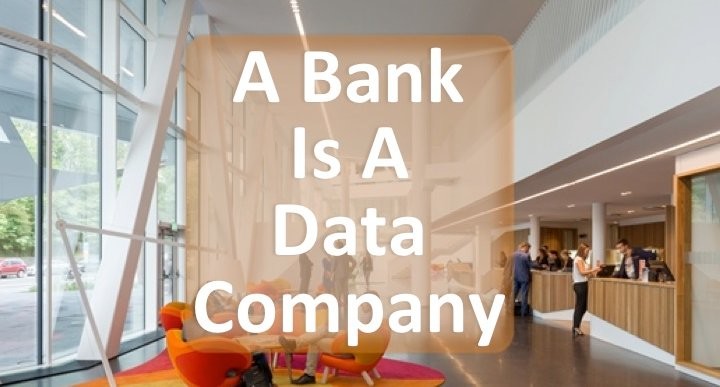
Banks are more data, than technology, companies with banking licenses. Here’s why.
What makes a company valuable today? It’s ability to monetize the data it sees and holds about its customers, now and in the future. And how does it monetize data? By applying intelligence on it to create outcomes and experiences that work for its clients. The role of technology is significant in both, but no more than that of an enabler. I wish to hence submit that bank chiefs need to consciously shift their recent narratives away from branding themselves as technology companies with banking licenses, to something that is much closer to data.
In fact, banks are the very definition of data companies, with data so rich that the likes of Facebook or Amazon would kill for it. And rich means RICH. Yet interestingly, JPMorgan, the world’s most valuable bank, with a history (read ‘data’) of over 218 years, when compared to Facebook (2004) and Amazon (1994), is valued at less than half of the $500Bn both these internet companies achieved just last month.
There is no question that banks have taken notice of the data goldmine they are sitting on, and have, in most cases, started at the right place – technology. IT IS THEIR ACHILLES HEEL. Bank technology is legacy, silo’d, slow, expensive, risky, and will just NOT support the opportunity their data presents. That is why spend on technology at banks is on the rise. According to a Jun 2017 IDC report, US Retail Banks’ spend on digital transformation will grow at a staggering 22.5% CAGR into 2020.
But for that reason, banks shouldn't just align themselves to technology. At their core, banks are purely upgrading technology to a very specific objective, to get a much better grip on their data – more speed, easier integration, greater coverage, less cost, and more such. This is because other than in transactions, nothing at banks really is real-time, even as yet. Lending decisions still take days. Inter-bank wire transfers still take hours, in some cases days. Simple things like address / signatory changes take days if not weeks. Besides an address change at a bank is just that. Unlike at Uber Eats where an address change may trigger a whole set of intelligently curated messaging about eateries in the vicinity of my new address based on my previous eating patterns. Banks don't even come close to this.
They simply cannot take refuge saying regulations are onerous. They are. I admit. But, to use an address change I made, and combining it with invaluable traces of dining habits that I left via my credit card spend over years, which then trigger a message to me from the bank informing me of similar restaurants in my new area of living, better still offer me a ‘settle-in well’ discount to go and try one, or home food delivery ideas, no regulator would come at a bank for telling me that. And that is nothing but just better use of data! It’s what can be called Amazon 101.
In fact, the slow improvement in use of data by banks surprisingly has not stayed regulators from forcing banks to share their data not just with each other, but also with 3rd parties. PSD2 in Europe and Open-Banking in UK are driving data sharing by regulation. Regulators seem to have taken quicker notice of customer needs than banks themselves.
So, here’s the rub: A bank is an enabler of an ecosystem /platform that is driven by the single objective of making every interaction with the client simple, convenient, secure and enriching. This eco-system / platform allows customers to take the right financial decisions based on data that is personalized and aggregated simply for them. This eco-system / platform will eventually then co-exist seamlessly with other platforms (health, shopping, travel etc.) with applications increasingly sharing the same underlying data, where relevant.
And just like Amazon has reinvented itself several times over since the dotcom era, it is not unthinkable that some banks, at least the bolder ones, will transform themselves into such eco-systems. And customers who begin to use this eco-system will themselves become the ones who create greater value for the bank, by sharing more of their data, voluntarily.
The goal banks need to pursue is to stich up their data, internally, externally, intelligently. The value of their banking licenses will shine thru greatest only then.
Hence the argument - Banks are data companies with banking licenses.
Partnerships, Global SIs
6yExcellent snippet! Loved it
Founder CEO @ Sambaash : Transforming learning ecosystem
6yNice article!! Absolutely, there are banks, telcos and utilities which provide real world services with large amount of data & then there are the social tech companies, which don't have real utilitarian services other than "induced" services .
HR DATA ANALYST at Coventry City Council
6yNice piece
Seasoned IT Services Leader, Digitalization Expert, Blockchain Evangelist, NASSCOM GCC Council (Karnataka) Member, & Co-Founder Ventures
6yAbsolutely! Banks and Telecom companies are probably the largest generators of data.
Blockchain, Crypto and Digital Currencies , Finance Global Program Lead at PayPal
6yAs far as customer experience, I fully agree with you. Banks have not been putting their customer first in designing their products. I'm starting to see better interface probably because banks see the pressure from other Fintechs. It is odd to read this sentence in your text but in this case, it is so true - Regulators seem to have taken quicker notice of customer needs than banks themselves.